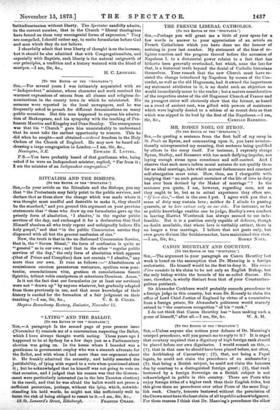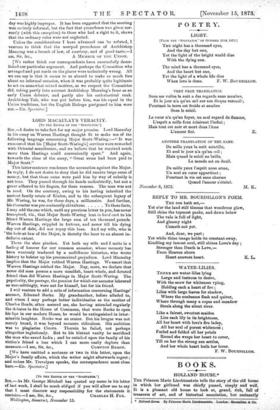[TO THE EDITOR OF THE "SPECTATOR. "] SIR,—Unless anyone else notices
your defence of Dr. Manning's usurped precedence, will you permit me to reply to it ? It is urged that courtesy required that a dignitary of high foreign rank should be placed before our own dignitaries. I would remark on this,— (1), that in that ease he should have been placed before, not after, the Archbishop of Canterbury ; (2), that, not being a Papal legate, he could not claim the precedence of an ambassador ; (3), that being a British subject, he could not claim the honours due by courtesy to a distinguished foreign guest ; (4), that rank bestowed by a foreign Sovereign on a British subject is not acknowledged in public in this country.- Thera are Peers who enjoy foreign titles of a higher rank than their English titles, but this gives them no precedence over other Peers of the same Eng- lish rank. Clearly, honours bestowed without the permission of the Crown must have the least claim of all to public acknowledgment. For these reasons I think that Dr. Manning's precedence the other
day was highly improper. It has been suggested that the meeting was entirely informal, but the fact that precedence was given cor- rectly (with this exception) to those who had a right to it, chews that the ordinary rules were not neglected.
Unless the considerations I have advanced can be refuted, I venture to think that the usurped precedence of Archbishop Manning was a breach of law, of courtesy, and of good-taste.—I [We rather think our correspondents have successfully demo- lished our particular argument. And perhaps the Committee who arranged and put cards on the places were technically wrong. All we can say is that it seems to us absurd to make so much fuss about an informal occasion, when it was probably quite legitimate to act on somewhat mixed motives, as we suspect the Committee did, taking partly into account Archbishop Manning's fame as an early Union debater, and partly also his ecclesiastical rank. Archbishop Tait, who was put before him, was his equal in the Union traditions, but the English Bishops postponed to him were not.—En. Spectator.]



































 Previous page
Previous page